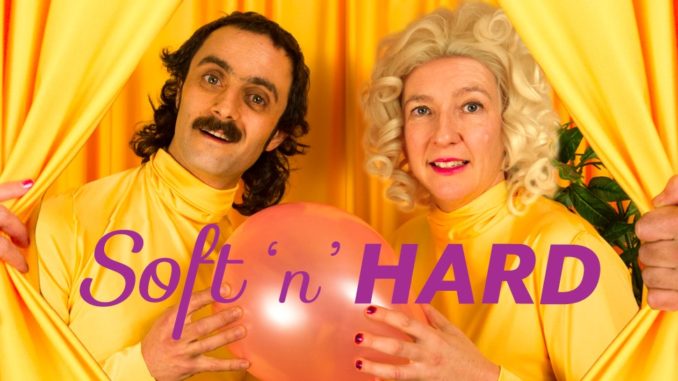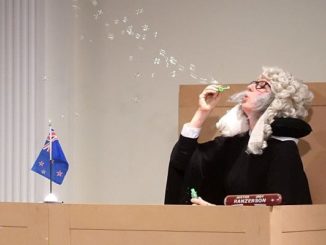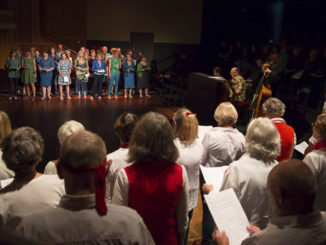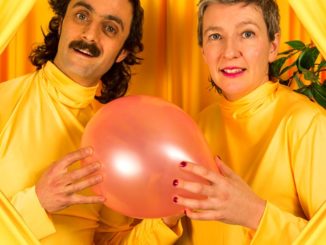
[Gender Conversations]
With a (silent mime’s) nod to the Topp Twins, Charlotte Perkins Gilman, and Samuel Beckett, Soft N Hard is an absurd comedy that pulls back the yellow curtains and naff Kiwi culture of the 80s to poke fun at kiwi gender constructions and relationships. Created by the husband and wife team behind Barbarian Productions, Jo Randerson and Thomas LaHood, the performance features clowning, surrealist costume, and a soundtrack including Enya, Engelbert Humperdinck, and Chris de Burgh, to explore passive female positioning, male privilege and toxic masculinity. The performance follows a married couple trapped in a relationship as they negotiate various desires and pressures while seemingly unable to escape their marriage and the bounds of the stage. Ultimately this is a comedy which explores normative and oppressive gender roles but which doesn’t necessarily move beyond them.
The performance opens on two long flats of yellow curtain that angle out from upstage centre and frame the playing area. Throughout the performance key set pieces, (a small table with drawer and a chair), as well as key props (a beer, wineglass and broom) are pushed into the space by yellow gloved-hands that extend briefly between slits in the curtain. Emerging to the sounds of electric disco beats, a body enveloped in a large round piece of cloth – reminiscent of a large skirt – begins to writhe across the stage. The skirt is joined a moment later by a poufy black shape, who emerges to Nintendo game sound effects and is reminiscent of the wacky waving inflatable tube men that are used to advertise sales at car yards. Beneath the costumes are ‘Jo’ and ‘Thomas’, the wife and husband couple whose relationship forms the central narrative thread of the performance. Throughout the performance we see Thomas slowly exit through the yellow curtain backdrop to loud male chanting of ‘do it, do it, do it’. He takes a long shower and eventually re-enters clad in wetsuit and tie. The male character is defined by leisure and seems compelled to acquiesce to the voices of his absent mates whenever the needs of his wife get ‘serious’. The wife begins as a giggling passive entity but slowly transforms and re-enters the space dressed in a blazer and self-assurance, intent on explaining things both to her husband and the audience.
Directed by Isobel MacKinnon, the production debuted at BATS theatre in 2017 and returns to Auckland’s Q Loft following a season last year at Q during the Tempo Dance Festival. On opening night the production was extremely well-received, so much so that I wondered why I wasn’t laughing as hard or as long as other audience members who were clearly tickled by the characters presented. Part of this could be explained by the committed fan-base that Barbarian Productions have developed over the years through a catalogue of fun and impressive work such as Grand Opening (2018-2019), Banging Cymbal, Clanging Gong (2001-2016) and Sing It To My Face (2014-2017). The impact on audiences can also be attributed to the comedic skills and craft of the performers who seem to effortlessly employ the clowning notions of complicité and Le Jeu, or play, in their performance. Key moments, gestures and interactions are imbued with a slight ‘nod’ or ‘wink’ at the audience, taking the form of a wry smile or depreciating gag, which work to involve the audience and give them permission to laugh.
In the new TV series Funny As: The Story of New Zealand Comedy (TVNZ), Jo Randerson comments on the Topp Twins’s comedy and their skill in being able to directly involve audiences. In Soft N Hard we can not only see the influence of the Topp Twins’ comedy in terms of celebrating kitsch Kiwi culture and the playful subversion of normative gender roles, but we also see the importance of directly engaging audiences. At one point in the show, exasperated by her husband’s behaviour, Jo pulls one of the yellow curtains down and drapes it over herself to create a ‘women’s safe space’. She quickly invites members of the audience to join her and drapes it over two women in the front row. It’s a fun moment of audience interaction but it is also subversive in its political commentary – becoming a commentary on Thomas’ (and male) impulse to constantly occupy space.
The performance begins in mime but, slowly, as the characters take shape, the clowning gags eventually give way to brilliant dialogue that captures some of the truths and complexities of gendered relationships. When Thomas attempts to apologise for constantly taking space, and for not knowing what to say or how to say it – Jo angrily exclaims to him ‘I would like you to stop squishing my existence. I would like you to listen to me when I get angry without getting defensive!’. The argument is the most compelling part of the performance. But just when I found I was really captivated by the dramatic tension and wondering where the performance was going to go – the performance abruptly ends. Although the performance gives us a glimpse of a female character that transforms from passive to active and is articulate about her needs, we are left with a male stereotype who becomes the scapegoat for male inadequacies. Ultimately, I found this aspect of the performance unsatisfying. We are living at a time when we are experiencing a crisis in male mental health and when activists and health professionals are working desperately hard to hammer home the message that men need to talk and express themselves. Yet this seems to contradict society’s increasing intolerance of men’s voices. The performance seems to reinforce the message that women are entitled to their anger and that their feelings are legitimate, but that men would do better to just shut up and listen. What might the next stage of the conversation look like?
Soft N Hard plays Q Loft until 24 August.




Leave a Reply